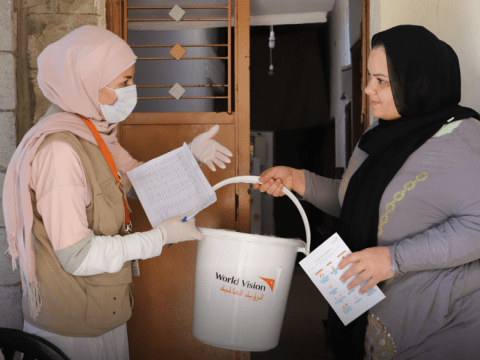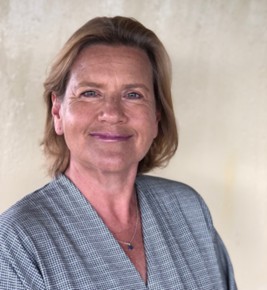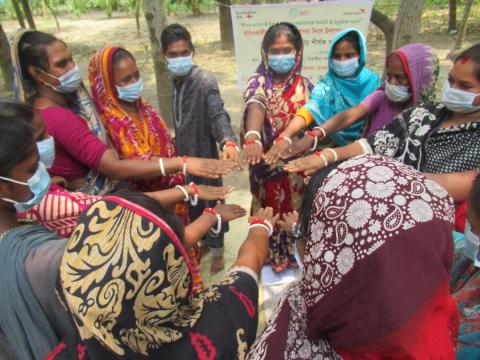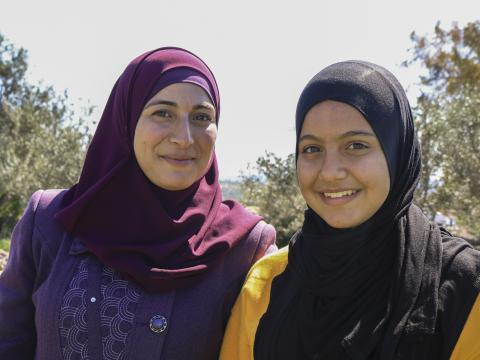
Deliver for women dignified access to aid
Eleanor Monbiot spotlights World Vision's research that shows aid, properly distributed, can empower women and help them better address physical, sexual exploitation and abuse.
As a woman every-one of us has felt unsafe at some time – walking on a dark street, empty car parks or intimidating groups. Along with the fear comes a sense of complete disempowerment. The inability to change or control the situation. Mercifully for the majority of the woman reading this, these feelings are fleeting, and we are able to move on and regain our confidence.
For the world’s most vulnerable women, there is no exit, and these threats are constant. Humanitarian crises, especially protracted ones, disproportionally impact women. A 2021 study, conducted by World Vision found that around 50 percent of surveyed women in Lebanon, Jordan and Türkiye felt they were not able to enjoy safety and freedom of movement outside home, with the same being true for over 70 percent of surveyed women in Iraq, north-west Syria or government of Syria ruled areas.
Nearly 27 million women and girls are currently subjects to modern slavery, of which 12 million are in forced labour, and 15 million in forced marriage. The extreme vulnerability found in displaced, and conflict affected populations, makes girls at even higher risk to these extreme and often violent abuses.
Let’s be clear, these are a woman or girl’s fundamental human rights of safety and protection that are being abused and ignored.
Empowering and protecting women is much more than an issue of justice amongst genders or physical safety issues. It is about fixing the vicious circle of violence and disempowerment, it is about empowering children to build better futures for themselves and their societies and allowing economies to reach their full potential by enabling everyone’s full participation.
As an international non-governmental organisation, World Vision believes that stopping Physical, Sexual Exploitation and Abuse (PSEA) is not only a matter of the adherence to a fundamental human right to feel safe but enabling dignified access to humanitarian aid by addressing gender inequalities and preventing abuse, is non-negotiable.
This is why we are transforming how we deliver aid, Empowered Aid which champions aid interventions that are focused on the prevention of PSEA, where we seek to develop models that reduce power disparities and give women and girls a clear and sustained voice in how aid is delivered. This is just one step to fulfilling the fundamental human rights of women which are too often overlooked, taken for granted or not considered.
Our Empowered Aid research showed that 28% of the refugee women we spoke to in Lebanon said they felt a lack of safety at aid distributions due to issues of physical/verbal fighting and theft, COVID-19 exposure, sexual exploitation and abuse, and gender-based violence.
In response to these stark findings, changes have been made to ensure everyone is aware of their rights, distribution can be done in family groups or at household level, more women aid workers and women’s committees are involved, and there is sensitisation of the whole community on gender-based violence and physical sexual exploitation and abuse.
The reality remains though that survivors may not seek help due to blame, shame, lack of family or community support, “scandal,” fear of abuser, and/or the concern of not being able to access aid. In addition, there is a lack of trust in reporting mechanisms, as they fear backlash from NGOs, family, or community which prevents reporting. These issues are not quick to fix but are fundamental in ensuring physical sexual exploitation and abuse is addressed and prevented.
There is so much more to do, and this week sees the Global Women Deliver 2023 conference in Rwanda, bringing together many of the world’s greatest leaders, advocates and researchers to address compounding issues impacting girls and women — from climate change, to gender-based violence, to unpaid care work — and collectively identify and action evidence-based solutions, greater investment and increased political will.
Empowering Aid is one such proven approach, but without a fundamental shift in ensuring the safety and empowerment for every woman and every girl - everywhere, we are failing ourselves and we are failing to empower the secure the future of our children.
Learn more about World Vision's engagement with Women Deliver here
Eleanor Monbiot, OBE is the Regional Leader, Middle East and Eastern Europe Region, covering Afghanistan, Albania, Armenia, Bosnia Herzegovina, Georgia, Iraq, Jerusalem, West Bank and Gaza, Jordan, Lebanon, Moldova Romania, Syria, Turkiye, Ukraine and Yemen, with responsibility for more than 2,200 staff. Previously, Eleanor was the Global Director, Field Operations, across World Vision's 73 countries covering World Vision’s Programming and Operations. She has worked in the Humanitarian and Development area for 30 years and had lived in Albania, Bosnia, Latvia, Kenya, Ghana and has worked in over 40 countries. Find her on Twitter @EleanorMonbiot


